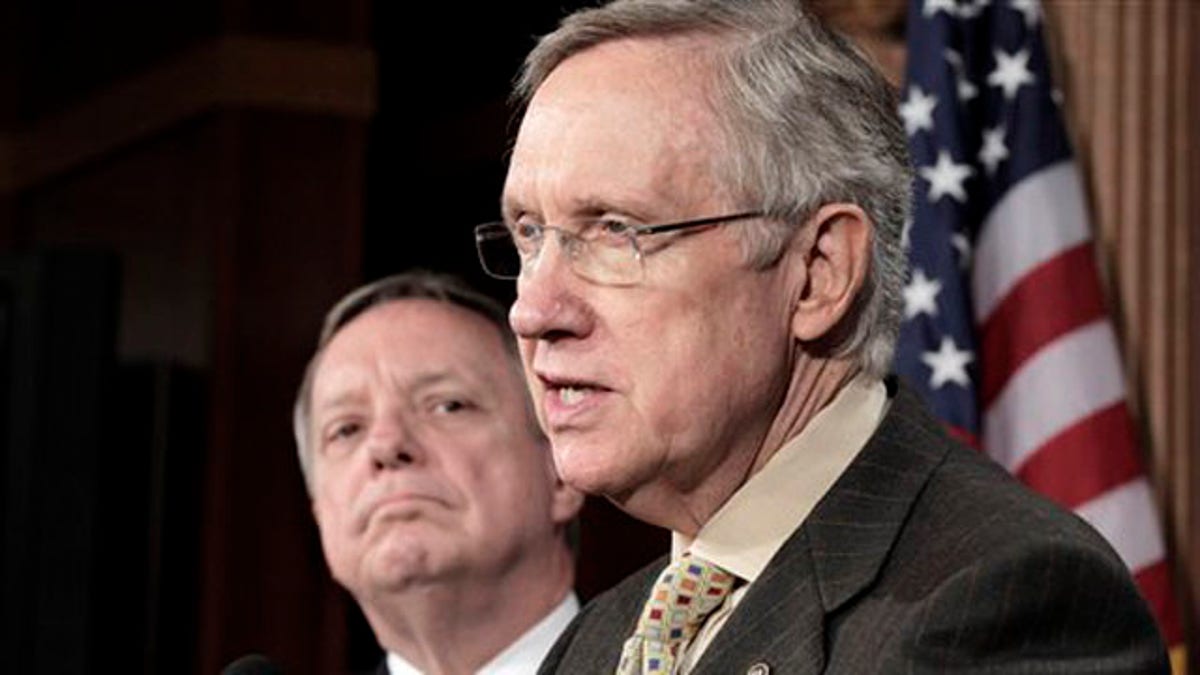
Senate Majority Leader Harry Reid, right, accompanied by Senate Majority Whip Richard Durbin, speaks to reporters on Capitol Hill June 30. (AP)
Democrats who just days ago were pushing back on the potential terms for a "grand bargain" to shrink the deficit now claim they wanted that deal all along, a position they made clear after House Speaker John Boehner and fellow Republicans yanked it off the table.
Republicans who walked away from talks led by Vice President Biden last month now say negotiators should return to that framework, even though it calls for smaller cuts than they originally hailed.
Democrats who assailed the White House for putting entitlements on the table in pursuit of a major deficit-reduction package tsk-tsked Republicans over the weekend for setting their sights on something lower.
The shifting rhetoric on both sides of the aisle underscores how unsteady and confusing the talks are, with many lawmakers declining to say publicly what it would take to make a deal.
What it all comes down to may just be re-election.
On Monday, President Obama said he's "willing to move" in Republicans' direction as long as the GOP gives a little bit. He also acknowledged his own party's stubbornness about compromise.
"There's going to be resistance. There is, frankly, resistance on my side to do anything on entitlements. There is strong resistance on the Republican side to do anything on revenues. But if each side takes a maximalist position, if each side wants 100 percent of what its, you know, ideological predispositions are, then we can't get anything done," Obama said.
He then tossed in that he wants to work with House Speaker John Boehner but Boehner is facing a rank-and-file that is "rewarded for saying irresponsible things."
Speaking on a radio show Monday, Boehner agreed that it comes down to getting out of the political realm.
"The president is in re-election mode and as a result that's where a lot of this rhetoric comes from. I’ve told the president, and I've asked him, I said, 'Mr. President, let's forget about the next election. You forget about yours and I’ll forget about mine. And let's get serious about doing the right thing for the country,'" Boehner told The Laura Ingraham show.
The administration says Congress must approve an increase in the debt ceiling -- now $14.3 trillion -- by Aug. 2 or the country could default on its loans. Lawmakers met again at the White House Monday afternoon -- the third time since last week to try to come to terms.
But the sore points remain regardless of the claims by each side. The working group of lawmakers led by Biden identified $2 trillion, which would give Washington about a year and a half to accumulate more debt before the ceiling is hit again.
Republicans won't raise the debt limit any more than the amount of spending cuts. Democrats insist any cuts above $2 trillion be accompanied by tax increases.
Each party has its theories for why a compromise has been unattainable for so long, particularly after an accord between Republicans and the White House -- worth $4 trillion over 12 years -- seemed within reach late last week.
"It's disappointing that the president is unable to bring his own party around to the entitlement reform that he put on the table," said Don Stewart, spokesman for Senate Republican Leader Mitch McConnell.
The White House continues to push for a large package, though negotiators are expected to return Monday to discussing the kind of compromise touched upon in the Biden-led talks.
Democrats say they would prefer to "see the big deal" that was pulled off the table by Boehner on Saturday.
Senate Majority Leader Harry Reid "remains firmly committed to getting the most robust deal possible," said Reid spokesman Adam Jentleson.
On Monday, Obama made clear to lawmakers that they should not consider anything short-term as talks go forward.
"This is the United States of America, and, you know, we don't manage our affairs in three-month increments," he said.




